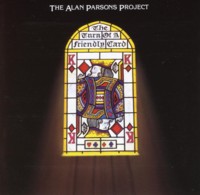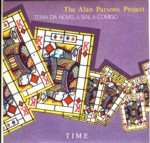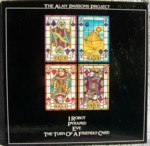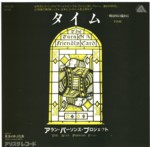 |
The Alan Parsons Project |
The Turn Of A Friendly Card |
 |
The Alan Parsons Project |
The Turn Of A Friendly Card |
This album was originally released by Arista Records in 1980. In an Arista press kit, Eric described the album as, "a reflection of something that was going on in my subconscious. It's tied up with Monte Carlo, gambling there and taking risks generally."
March 10, 2008 saw the release of a remastered version of this album, complete with bonus tracks and improved packaging.
| Concept: |
| AP: "Gambling and taking risks is the theme. No strange coincidences there, because we were already resident in Monte Carlo at the time, and recording in Paris. I think conceptually that was the most successful. I think just about all the songs related to the theme in some way, with the possible exception of 'Time'. I never really quite worked out what that had to do with gambling." |
| May Be A Price To Pay | vocal: Elmer Gantry | (5:01) |
| Games People Play | vocal: Lenny Zakatek | (4:24) |
| Time | vocal: Eric Woolfson | (5:14) |
| I Don't Wanna Go Home | vocal: Lenny Zakatek | (4:52) |
| The Gold Bug | instrumental | (4:34) |
| The Turn Of A Friendly Card Suite: | ||
| i The Turn Of A Friendly Card (Part One) | vocal: Chris Rainbow | (2:44) |
| ii Snake Eyes | vocal: Chris Rainbow | (3:15) |
| iii The Ace Of Swords | instrumental | (2:57) |
| iv Nothing Left To Lose | vocal: Eric Woolfson | (4:07) |
| v The Turn Of A Friendly Card (Part Two) | vocal: Chris Rainbow | (3:32) |
| BONUS TRACKS | ||
| May Be A Price To Pay (Intro/ Demo) | instrumental | (1:32) |
| Nothing Left To Lose (Basic Backing Track) | instrumental | (4:35) |
| Nothing Left To Lose (Chris Rainbow Overdub Vocal Compilation) | vocal: Chris Rainbow | (2:02) |
| Nothing Left To Lose (Early Studio Version with Eric’s Guide Vocal) | vocal: Eric Woolfson | (3:11) |
| Time (Early studio attempt) | instrumental | (4:42) |
| Games People Play (Rough Mix) | instrumental | (4:32) |
| The Gold Bug (Demo) | vocal: Lenny Zakatek | (2:49) |
May Be A Price To Pay
Vocal Elmer Gantry Piano and Organ Eric Woolfson Guitars Ian Bairnson Bass David Paton Drums and Percussion Stuart Elliott Orchestra arranged and conducted by Andrew Powell
Games People Play
Vocal and Vocal FX Lenny Zakatek Keyboards Eric Woolfson Projectron Alan Parsons Guitars Ian Bairnson Bass David Paton Drums Stuart Elliott Backing Vocals Chris Rainbow
Time
Vocal Eric Woolfson Additional Vocals Alan Parsons Piano Eric Woolfson Pitch Shifted Guitar Ian Bairnson Acoustic Guitars Ian Bairnson, David Paton Bass David Paton Drums and Percussion Stuart Elliott Backing Vocals Chris Rainbow Orchestra arranged and conducted by Andrew Powell
I Don't Wanna Go Home
Vocal Lenny Zakatek Piano Eric Woolfson Guitars Ian Bairnson Bass David Paton Drums Stuart Elliott Backing Vocals Chris Rainbow
The Gold Bug
Human Whistle, Echoed Clavinet, Autoharp and Finger Clicks Alan Parsons Tremolando Acoustic Guitars Ian Bairnson, David Paton Guitars Ian Bairnson Bass David Paton Drums and Harmonized Rotating Triangle Stuart Elliott Sax A session player in Paris whose name escapes us Vocals Chris Rainbow
The Turn Of A Friendly Card (Part One)
Vocal Chris Rainbow Piano and Harpsichord Eric Woolfson Guitars Ian Bairnson Bass David Paton Drums and Percussion Stuart Elliott Orchestra arranged and conducted by Andrew Powell
Snake Eyes
Vocal Chris Rainbow Piano Eric Woolfson Guitars Ian Bairnson Bass David Paton Drums and Percussion Stuart Elliott Chorus Vocals All band and studio staff
The Ace of Swords
Harpsichord and Clavinet Alan Parsons Piano Eric Woolfson Guitars Ian Bairnson Bass David Paton Drums and Percussion Stuart Elliott Orchestra arranged and conducted by Andrew Powell
Nothing Left To Lose
Vocal Eric Woolfson Acoustic Guitars Ian Bairnson Bass David Paton Drums Stuart Elliott 'Button' Accordion An unidentified Parisian session player Backing Vocals Chris Rainbow
The Turn Of A Friendly Card (Part Two)
Vocal Chris Rainbow Piano and Harpsichord Eric Woolfson Guitars Ian Bairnson Bass David Paton Drums and Percussion Stuart Elliott Orchestra arranged and conducted by Andrew Powell
BONUS MATERIAL NOTES
by Eric Woolfson & Alan Parsons
January 2008
The recording process contains many magical moments on the creative journey. The process is not unlike throwing a lump of clay on a potter's wheel and then shaping and re-shaping the material an infinite number of times until the potter is satisfied. A casual observer might say "but you had the pot within the first minute, why didn't you just leave it at that." The art of the potter is to know just how far to go. The record producer's skill is to know when that point has been reached as far as the recordings are concerned and the writer has to apply a similar process to his compositions. They say a poem is never finished, it is abandoned. The same could certainly be said of music, lyrics or any creative effort. The great advantage of the recording process is that as one keeps rough mixes as a guide, one can delve into stages before the point of abandonment and revisit some of the magic from earlier attempts or stages.
Whenever the core musicians compete a basic backing track, there is a sensation of having reached a plateau and although the eventual production may take the recording in a totally different direction, at that moment something rather special has been created which the music buyer is often unaware of.
Amongst this collection of bonus material, there are several examples of the magical early takes and in this re-mastered version of The Turn Of A Friendly Card, for those interested in the process, there is a unique opportunity to glimpse behind the curtain of the recording process. We have also included a track 'No Answers Only Questions' which was left out of the album, together with an early version of it which is differently constructed.
From our personal point of view, it has been a fascinating experience to re-live these early stages, much of which were kept in archives and tape libraries and which might have well been forgotten with the passage of time but for the initiative of Tim Fraser-Harding at SONY BMG. We are also grateful to Haydn Bendall for his untiring patience and skill in assisting us in our trawl through the archives to complete this material.
May Be A Price To Pay(Intro/ Demo) It was always intended that this piece would become the opening "fanfare" for the album, but it was later butted up to the main part of May Be A Price To Pay and became a part of that track. Nothing Left To Lose (Basic Backing Track) We have included three aspects of ‘Nothing Left to Lose’ which in a way is an anatomy of a recording. As with many Project tracks, the original track was built around a keyboard part played by Eric and was then eventually replaced by guitars. Alan felt that if a song was written on the piano and recorded with a piano, it was too restrictive and this bonus material when compared with the final mix, shows the kind of development that happened on most Project recordings. Nothing Left To Lose ( Chris Rainbow Overdub Vocal Compilation) The section of Chris Rainbow magic, which was often incorporated on Project recordings, can really be heard in all its glory when isolated as we have done here. Nothing Left To Lose (Early Studio Version with Eric’s Guide Vocal) The marvelous accordion solo which was added later, had its genesis as a basic keyboard sample in this attempt. Time (Early studio attempt) The recording process for an individual backing track could literally take days and ideas developed as the musicians became more familiar with the material. This is an example of an early take of ‘Time’ which was subsequently developed and refined considerably. Sometimes, you can quickly reach a point of satisfaction with the basic track, but usually in the case of Projects, the process was quite exhaustive and many months were spent in the studio on each album – a luxury which is rarely possible in today’s music business. This album, however, was an exception and was recorded from beginning to end in six weeks in Paris. Despite the time constraints they were under at the time, both Alan and Eric consider ‘The Turn of a Friendly Card’ album to be one of their best recordings, though no doubt if they had had six months available they would have probably used it all! Games People Play (Rough Mix) Many Project recordings used a loop instead of an electronic click or metronome and ‘Games People Play’ was a good example where the loop which controlled the tempo was incorporated itself in the final mix. To make this loop, Eric recorded a keyboard section to a click and a good section was cut out and edited into the full length. This rough mix is not far away from the final version except that it has "More Cowbell" as Christopher Walken and Will Farrell would have liked on Saturday Night Live! The Gold Bug (Demo) The main keyboard sound on this demo is an original Hohner Clavinet with damped strings and a repeat echo (not a synth) which was also set up for the final studio version. It was difficult to get it in tune because of the short duration of the notes. ‘The Gold Bug’ was the title of an Edgar Allan Poe short story.
BONUS MATERIAL NOTES
Produced and Engineered by Alan Parsons
Executive Producer - Eric Woolfson
Orchestra Arranged and Conducted by Andrew Powell
Engineered by Alan Parsons
Mastering Consultant Chris Blair
Sleeve Concept Lol Creme & Kevin Godley
Bass: David Paton
Drums and Percussion: Stuart Elliott
Acoustic and Electric guitars: Ian Bairnson
Keyboards: Eric Woolfson
Additional Keyboards: Alan Parsons
The Orchestra of the Munich Chamber Opera Care of Eberhard Schoener
Leader - Sandor Farcas
Orchestra Coordinator Curtis Briggs
Vocals: Elmer Gantry, Lenny Zakatek, Eric Woolfson, Chris Rainbow
Backing vocals: Chris Rainbow, Lenny Zakatek, Alan Parsons
Recorded at Acousti Studio, Paris
Orchestra recorded at Arco Studio Munich
Special thanks to Colin Caldwell, Kika, Elyane, Bob, J.B., Alain, Richard, Michel, Clement, Joseph and of course, Scoubidou, all of Acousti Studios; Dave Siddle, David Rockberger, Leonard Green, Roger Selby, Peter Dean at Publison, Roger Trinder, George Bozier and Bill Timmins, Ken Townsend, Aron Misan, Charles Levison, Bob Buziak, Smokey, Hazel and Kath
Very special thanks to Charles Levison and Bob Buziak
Chris Rainbow and David Paton appear courtesy EMI Records
REISSUE CREDITS
Compiled for reissue by Eric Woolfson & Haydn Bendall (for Woolfsongs Ltd.), Tim Fraser-Harding & Jeff Magid (for SONY BMG) and Alan Parsons.
Expanded Edition Mastered by Dave Donnelly and Alan Parsons at DNA Mastering, Studio City, California.
Reissue design by Mainartery Design, London (www.mainartery.co.uk)
Memorabilia - With thanks to Steve Martin, Sally Seddon and Mainartery
Special thanks to Tim Fraser-Harding, Haydn Bendall and Sally Seddon
Published by Woolfsongs Ltd./Careers Music Inc. (BMI) .
Administered by Universal Music.
All tracks written by Eric Woolfson and Alan Parsons
Used by Permission. All rights reserved.
All bonus tracks patent 2008, Licensed courtesy of Woolfsongs Ltd.
One of the benefits of the Expanded Edition of the classic APP albums is the improved bookelets and extra artwork. Early in the remastering project Tim Fraser-Harding contacted Steve Martin at The Avenue about artwork and rarities.
Many of the images submitted were used within the booklet, but just like "No Answers Only Questions", some things got left on the cutting room floor. In spirit of the Extended Editions, here are three of the images that didn't make the cut.
 |
 |
 |
Left: "Time" 7" single sleeve; Middle: limited-edition box-set; Right: "Time" 7" single sleeve from Japan.
Click on any image to enlarge.
This page, copyright 2009 The Avenue / Avenue Communications.